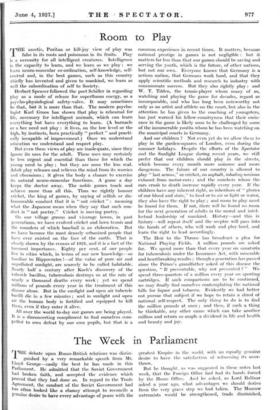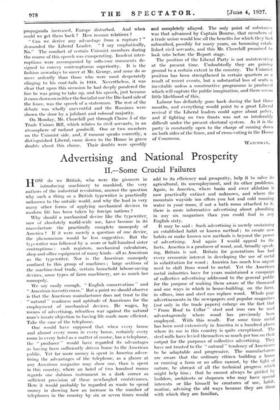The Week in Parliament
THE debate upon Russo-British relations was distin- 1 guished by a very remarkable speech from Mr. Lloyd George—easily the best he has made in this Parliament. He admitted that the Soviet Government had broken faith, and accepted the evidence which Proved that they had done so. In regard to the Trade Agreement, the conduct of. the Soviet Government had too often looked like a clumsy attempt to reconcile a gemune desire to have every advantage of peace with the greatest Empire in the world, with an equally genuine desire to have the satisfaction of witnessing its over- throw.
But he thought, as was suggested in these notes last week, that the Foreign Office had had its hands forced by the Home Office. And he asked, as Lord . Balfour asked a year ago, what advantages we should derive from the very grave step we had taken. The Moscow extremists would be strengthened, trade diminished, propaganda increased, Europe disturbed. And when could we get them back ? How resume relations ?
" Can we derive any advantage from a rupture ? " demanded the Liberal Leader. " I say emphatically, No." The conduct of certain Unionist members during the course of this speech was exasperating. Insolent inter- ruptions were accompanied by sotto-voce comments de- signed to convey contemptuous superiority. It is the fashion nowadays to sneer at Mr. George, and none do so more ardently than those who were most desperately clinging to his coat-tails in 1918. Nevertheless, it was clear that upon this occasion he had deeply pondered the line he was going to take up, and his speech, just because it came down on neither the Socialist nor the Die-hard side of the fence, was the speech of a statesman. The rest of the debate was wholly uneventful and the Russians were shown the door by a jubilant and colossal majority.
On Monday, Mr. Churchill put through Clause 5 of the Trade Unions Bill, which relates to civil servants, in an atmosphere of radiant goodwill. One or two members on the Unionist side, and, if rumour speaks correctly, a distinguished Liberal, came down to the House in grave doubts about this clause. Their doubts were speedily and completely allayed. The only point of substance was that advanced by Captain Bourne, that members of a trade union would lose all the benefits for which they had subscribed, possibly for many years, on becoming estab- lished civil servants, and this Mr. Churchill promised to look into before the Report stage.
The position of the Liberal Party is not uninteresting at the present time. Undoubtedly they are gaining ground to a certain extent in the country. The Unionist position has been strengthened in certain quarters as a result of recent events, but a substantial loss of seats is inevitable unless a constructive programme is produced which will capture the public imagination, and there seems little likelihood of this.
Labour has definitely gone back during the last three months, and everything would point to a great Liberal revival if the Liberal leaders could agree about policy; and if fighting on two fronts was not so intolerably difficult under the present electoral system. As it is the party is constantly open to the charge of coming down on both sides of the fence, and of cross-voting in the House of Commons.
WATCHMAN.







































 Previous page
Previous page